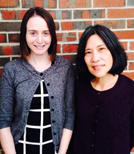The Harvard Family Research Project separated from the Harvard Graduate School of Education to become the Global Family Research Project as of January 1, 2017. It is no longer affiliated with Harvard University.

|
December 5, 2013 Strengthening Family Engagement Through Teacher Preparation and Professional DevelopmentM. Elena Lopez, Christine Patton
|
FINE Newsletter, Volume V, Issue 4
Issue Topic: Innovative Approaches to Preparing and Training Educators for Family Engagement
Commentary
In this Commentary, HFRP’s M. Elena Lopez and Christine Patton discuss the importance of teacher preparation in family engagement, and highlight the ways in which we at HFRP are working to advance educator training and professional development in this field.
Educators play a key role in engaging families in children’s learning. When school leaders create a welcoming climate and build trusting relationships with families, they are likely to influence staff members and create an environment that encourages active engagement. When teachers talk to parents about their child’s progress and share ideas for helping the child learn at home, parents respond positively. These partnerships between families and schools carry several benefits for students—improved attendance, positive social skills, and higher grades. Additionally, these partnerships benefit teachers and schools, as teachers have closer relationships with students who have highly involved parents,1 and schools experience less turnover when teachers perceive that they are supported by families.2
Many educators are eager to engage families, but they often lack adequate time to learn and practice the skills that they need to do so effectively. Through common daily activities during their pre-teaching years, many future teachers gain experience that will eventually be helpful throughout their teaching careers. Such activities as interacting with children (e.g., through relationships with younger siblings and cousins, babysitting and summer jobs as camp counselors, and college practica), learning how to engage with adults in a professional manner (e.g., talking to parents about logistics during pickup and drop-off times at summer camp jobs or talking to friends’ parents), and creating curricula through their BA/MT programs’ classes provide future teachers with a basic foundation for working with children and adults. However, once they are in the classroom, teachers realize that effectively communicating with and engaging families are two of the biggest challenges that they will face, particularly those who teach at the high school level and in schools with large percentages of low-income families and English Language Learners.3,4 Teachers often do not get the opportunity to engage with families as partners in helping students’ learning and development until they enter their classrooms for the first time.
Educators are able to learn and practice family engagement techniques prior to entering the classroom and throughout their teaching careers through ongoing training/professional development. We at HFRP are working to advance educator training and preparation in this vital area of family engagement. Starting with our publication of New Skills for New Schools: Preparing Teachers in Family Involvement in 1997, we have been offering recommendations derived from case studies of existing teacher education programs, tools, and resources to advance this work. This year (2013) marks the publication of the third edition of our casebook, Preparing Educators to Engage Families: Case Studies Using an Ecological Systems Framework, which illustrates the complexity of family, school, and community ties, thereby inviting problem-solving and reflective practice into the teacher training arena.
This issue of the FINE Newsletter continues to explore how university and college faculty members and trainers are using the case method in creative ways—often combining them with activities to enrich classroom discussions. We also highlight how new technologies are expanding the opportunities for teachers to develop the knowledge, skills, and disposition to partner meaningfully with families. Important among these opportunities are online distance learning courses, which offer participants the chance to engage in online discussions that can help them gain confidence to share their ideas during in-person meetings. In addition, we look at ways in which simulations are particularly helpful in offering pre- and in-service teachers a “safe space” in which to try out conversations with virtual families and to learn from mistakes without feeling criticized. Lastly, we explore how the literature on training and implementation science offers insights for preparing educators in family engagement.
As you read this issue, we invite you to think about the following questions:
- What do the educators that you know say about the pre-service and in-service training they have received to help them partner with families? How can the activities in this issue of the FINE Newsletter help them further develop the skills that they need?
- How successful are we, as a field, in providing opportunities for educators to learn to partner with families in an effective manner? How can we measure our success?
- What changes do we, as a field, need to make to better prepare educators to partner with families?
We always love hearing from our FINE members. Email us at fine@gse.harvard.edu.
1 Wyrick, A., & Rudasill, K. M. (2009). Parent involvement as a predictor of teacher-child relationship quality in third grade. Early Education & Development, 20 (5), 845–864.
2 Allensworth, E., Ponisciak, S., & Mazzeo, C. (2009). The schools teachers leave: Teacher mobility in Chicago public schools. Chicago: Consortium on Chicago School Research.
3 Harris Interactive. (2008). The MetLife survey of the American teacher: Past, present and future. Retrieved from: http://www.eric.ed.gov/PDFS/ED504457.pdf
4 Harris Interactive. (2011). The MetLife survey of the American teacher: Teachers, parents and the economy. Retrieved from: https://www.metlife.com/assets/cao/contributions/foundation/american-teacher/MetLife-Teacher-Survey-2011.pdf
This resource is part of the December 2013 FINE Newsletter. The FINE Newsletter shares the newest and best family engagement research and resources from Harvard Family Research Project and other field leaders. To access the archives of past issues, please visit www.hfrp.org/FINENewsletter.
